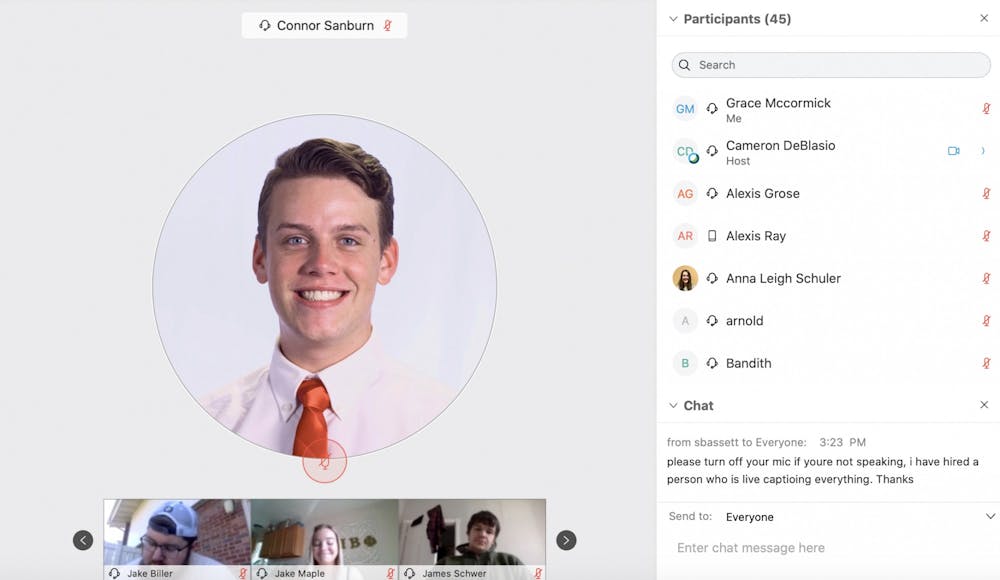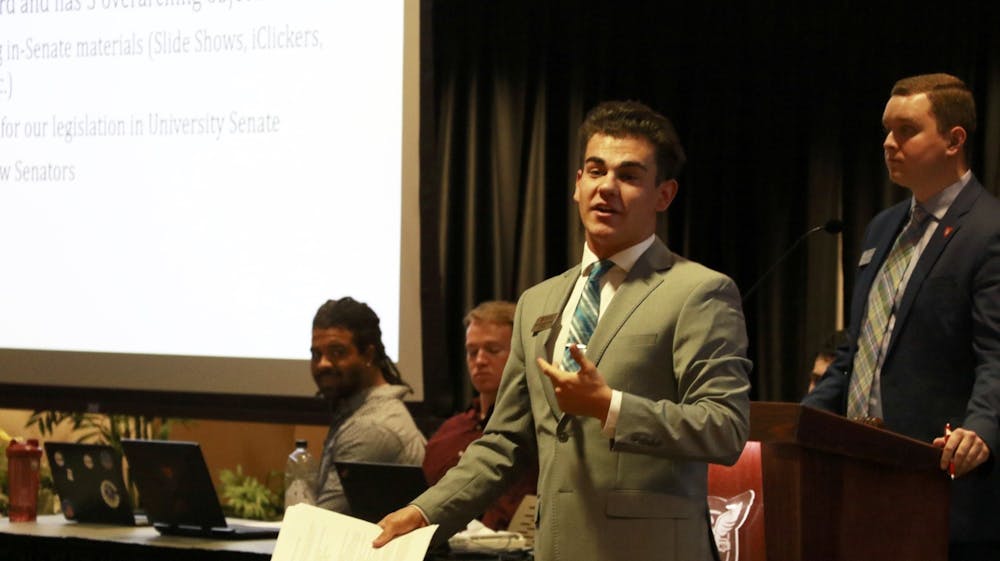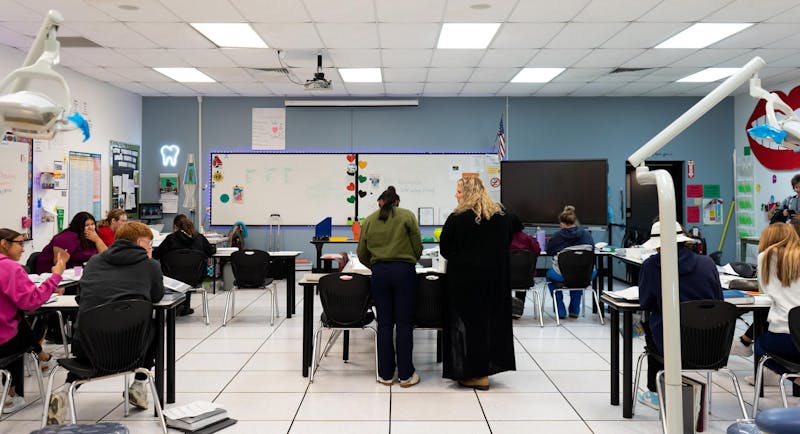Editor's note: This article has been updated to reflect the correct scheduled inauguration date for the new executive slate.
The scheduled inauguration for the Bold slate on April 15 was canceled due to federal guidelines suggesting no in-person meetings above 10 people.
Student Government Association (SGA) President Aiden Medellin said in his March 25 executive report that the new executive slate’s inauguration may take place over Cisco’s Webex online video conference platform, but details are still being decided.
“If it is via Webex, we’ll make sure we allow people who want to attend and watch to come as well,” Medellin said. “We’re working out exactly how we’re going to do that formal process for the incoming executive [board].”

Connor Sanburn, chief of staff, gives his executive report in SGA's virtual meeting. Sanburn is the president elect for the Bold slate and may be inaugurated at a later date or via Cisco's Webex. Grace McCormick, Screenshot Capture
Here are descriptions of the five different amendments introduced during SGA's virtual meeting Wednesday:
Rank choice voting in SGA elections:
One of the amendments would change the current process of voting in SGA elections.
If passed, the bill titled “A Senate Amendment to Implement Rank Choice Voting and to add the Choice of No Confidence in SGA Executive Elections” would allow election seasons to avoid runoff elections.
The amendment would allow election voters to rank their preferred executive slate if three or more slates run. If only two slates run, the amendment would not change the current process of the slate with the majority vote winning the election.
“Rank choice voting is an easier voting process in general,” said Lauren Kamykowski, author of the amendment. “The only real change is that ranked choice voting allows us to find out the preferences of students immediately on the initial ballot as opposed to waiting for the runoff to end and a second vote to take place.”
Kamykowski said she was inspired by the 2019 SGA executive election, the first time a second round runoff election took place, to write the amendment. When the 2020 election also had a runoff election, she said it was concerning for student voters.
“In every runoff, the voting participation from the student body drastically decreases,” she said. “With this new process students only have to vote one time by ranking the executive slates in order of their preference.”
The rank choice voting amendment would tally all first choice online votes for three or more slates and eliminate the slate with the fewest number of first choice votes. If a majority vote is not reached, second choice votes will be tallied before factoring in third choice votes to come to a majority vote for one slate.
If a rank choice vote ends in a tie, the senate will decide the next executive slate through secret ballot voting, which is the same process currently in place for a runoff election tie.
Also in the amendment, the choice of “no confidence” will be formally added as a choice in all executive ballots.
Kamykowski said she thinks “it is likely the amendment will pass.”

Senators review legislation that would implement ranked choice voting and eliminate runoff elections March 25, 2020, over a Cisco's Webex virtual meeting. During the past two election seasons, runoff voting has shown a smaller percentage of students voting than in the first round of election. Grace McCormick, Screenshot Capture
Unprotected seats in the organizational caucus:
At-large caucus chair and President Pro Tempore elect Dylan Lewandowski introduced an amendment that would expand the organizational caucus by lifting the restrictions on the number of unprotected seats student organizations can have.
The current SGA bylaws state university recognized organizations are allowed to apply for protected and unprotected seats. Protected seats guarantee an offer to an organization to continue to have representation in the organizational caucus each term.
Unprotected seats are gained through collecting 300 student signatures and presenting to the senate why an organization wants representation. Unprotected seats are limited to four organizations and those seats are not guaranteed continual representation.
“We are currently not serving the student body as well as we potentially could,” the legislation states. “There are hundreds of organizations on Ball State’s campus … these organizations should all be given an equal opportunity to work directly with SGA.”
Lewandowski said allowing for an unlimited number of unprotected seats for organizations in the organizational caucus can inspire students to vote in SGA elections.
“I feel like if students are involved in organizations and they value their representation within SGA, there can be a trickle-down effect as far as students [who] understand and value SGA,” he said. “I don’t think expanding the number of chairs available will make the application process easier, because organizations applying will still have to get their 300 student body signatures, but I think organizations can feel more connected to SGA.”
Lewandowski said the amendment titled “Organization Caucus Expansion” can provide diverse perspectives in the senate.
“The goal and purpose of the Student Government Association is to accurately represent the student body,” he said. “I see a great opportunity to have more representation and more viewpoints added to the senate through this.”
Standing Committee Expectations:
Lewandowski also proposed an amendment to change standing committee expectations.
Standing committees are currently expected to introduce one piece of legislation each semester. The amendment “Redefining Standing Committee Expectations” proposes that sponsoring an event or conducting research can also fulfill a committee’s obligation.
“During all of my four semesters in SGA, there has been at least one standing committee that has not submitted a piece of legislation,” Lewandowski said. “But at the same time, I believe we still have initiatives and events happening within our communities.”
Lewandowski said the goal of the amendment is to best serve the Ball State community through standing committee events, research and legislation. He said conducting research can help a committee introduce legislation in later semesters.
“Your credibility grows if you have statistics and real-life data from the community you actually live in, in your legislation.” he said. “A senator will not get as far with their legislation if they quote statistics from other universities rather than reaching out to Ball State students and faculty members who will be directly affected by legislation.”
Lewandowski said that although this amendment would provide other opportunities for a standing committee to fulfill its obligation to the senate, he does not think the amount of legislation written by committee members will decrease.
“Writing legislation doesn’t always correlate with physical action,” he said. “Legislation may have a more heartfelt purpose because of this amendment because people won’t just write something to get things done.”
Requirements of the parliamentarian:
Also in Wednesday’s meeting, an amendment to change the requirements of the parliamentarian was introduced.
The amendment would require the parliamentarian to be a member or former member of the senate. This is a precedent that is not in SGA’s official bylaws.
“I believe that a position as important as the Parliamentarian should be filled by someone who has extensive knowledge of not only SGA’s constitution and bylaws, but of the workings of the senate,” said Chase Braden, who authored the amendment.
Bylaws affecting academic affairs committee:
Finally, an amendment to update the responsibilities of the academic affairs committee proposed an update to the language used in SGA bylaws.
The bylaws state the academic affairs committee should work with the director of academic affairs, a position that does not exist.
Ruby Yantz and Braden propose in the amendment that the bylaws be updated to state the academic affairs committee “shall meet with the Vice Provost of Academic Affairs” — a role currently occupied by Kecia McBride.
The senate will vote on each of the five amendments introduced Wednesday through a Webex meeting on April 1. Polling will be done using Webex’s poll feature.
Contact Grace McCormick with comments at grmccormick@bsu.edu or on Twitter @graceMc564.





The Daily News welcomes thoughtful discussion on all of our stories, but please keep comments civil and on-topic. Read our full guidelines here.